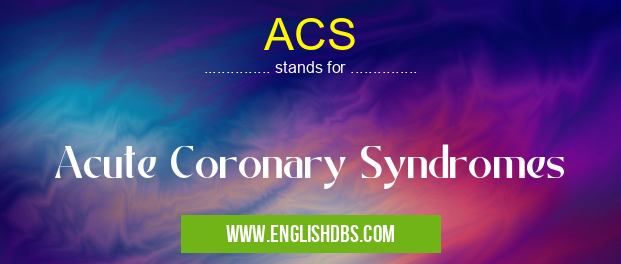What does ACS mean in MEDICAL
Acute coronary syndrome (ACS) is a medical condition caused by the sudden narrowing or blockage of the arteries in the heart leading to reduced or blocked blood supply. It is a serious condition that requires treatment, because it can lead to life-threatening complications such as a heart attack. ACS is commonly diagnosed when there are high levels of certain hormones, including troponin and creatine kinase-myocardial band (CK-MB), in a person's blood.

ACS meaning in Medical in Medical
ACS mostly used in an acronym Medical in Category Medical that means Acute Coronary Syndromes
Shorthand: ACS,
Full Form: Acute Coronary Syndromes
For more information of "Acute Coronary Syndromes", see the section below.
Definition
In medical terms, Acute Coronary Syndrome (ACS) refers to a group of symptoms that occur when the blood supply to part of the heart becomes suddenly blocked, reducing oxygen supply and resulting in chest pain. It includes unstable angina and myocardial infarction (heart attack). The most common cause of acute coronary syndrome is atherosclerosis, which is when fatty deposits build up on artery walls over time, making them narrower and less flexible. Other risk factors for developing ACS include high cholesterol levels, uncontrolled diabetes, smoking and family history of heart disease.
Symptoms
The major symptom associated with ACS is chest pain or discomfort that may be sharp or burning in nature; often described as pressure, heaviness or tightness in the chest area. Additional warning signs may include pain radiating down one or both arms, shortness of breath/labored breathing, cold sweats/clammy skin and fatigue/weakness. If any of these symptoms occur they should be reported to medical personnel immediately as immediate diagnosis and treatment can save lives.
Diagnosis
In order to diagnose an individual with ACS various tests are performed in order to determine the severity of the patient's individual case. These tests include an electrocardiogram (ECG) which records electrical activity within the heart muscle; blood tests measuring levels of enzymes released from damaged cells within the heart muscle; echocardiography which uses sound waves to create pictures of the structure and motion inside the heart; CT scan imaging to identify narrowed regions within arteries; MRI scan imaging; exercise stress tests; coronary angiography which uses dye injection to identify blockages within arteries providing detailed information about their location and severity.
Treatment
Treatment plans for ACS are tailored towards each individual depending on their specific conditions however typically involves medications such as aspirin therapy, anticoagulants/blood thinners and nitrates which help improve circulation by dilating narrowed arteries increasing oxygen flow through arteries promoting recovery once symptoms appear subordinate care such as lifestyle changes including diet modifications exercising regularly avoiding smoking cessation stress relief techniques seeking emotional support are also recommended in order for individuals regain stability after having experienced an acute coronary event
Essential Questions and Answers on Acute Coronary Syndromes in "MEDICAL»MEDICAL"
What is Acute Coronary Syndrome (ACS)?
Acute Coronary Syndrome (ACS) refers to a set of symptoms that indicate a sudden decrease in blood flow to the heart. It is often caused by a narrowing or blockage of the arteries that supply blood to the heart, and can result in chest pain, heart attack, and death.
What are the common signs and symptoms of ACS?
Common signs and symptoms of ACS include chest pain, shortness of breath, nausea, sweating, fatigue, lightheadedness, and palpitations. These symptoms can vary from person to person and may indicate either a heart attack or an unstable angina.
How is ACS diagnosed?
ACS is diagnosed through medical evaluation that includes physical examination, laboratory tests such as a complete blood count (CBC), electrocardiogram (ECG), echocardiogram (Echo), cardiac stress test, coronary angiogram (heart catheterization), and other imaging tests.
Are there any lifestyle changes I can make to reduce my risk of ACS?
A healthy lifestyle has been shown to significantly reduce the risk of developing ACS. Healthier habits such as regular physical activity; not smoking; controlling high blood pressure; maintaining an optimal body weight; eating healthy foods; limiting alcohol intake; managing cholesterol levels; and avoiding stress can all help reduce your risk for developing ACS.
Is there any medication available for treating symptoms associated with ACS?
Yes! Treatment for acute coronary syndrome typically consists of medications such as antiplatelet agents to prevent clotting as well as statins to lower cholesterol levels. In some cases anticoagulants may also be prescribed along with beta blockers for symptomatic relief.
If I am experiencing chest pain should I go directly to the emergency room?
Yes if you experience sudden chest pain it is important that you seek immediate medical attention since it could be a sign of a more serious condition such as acute coronary syndrome or a heart attack. Your doctor will help you determine whether further treatment or intensive care is required.
What kind of follow-up care should someone who has had an episode of ACS expect?
After an episode of ACS, your doctor will likely recommend regular follow up appointments with them so they can monitor your progress and adjust your treatments accordingly. It's also recommended that patients with ACS take measures like quitting smoking, exercising regularly and watching their diet in order to ensure long-term health benefits.
How can I prevent another episode of ACS?
Taking steps towards living a healthier lifestyle such as quitting smoking; drinking moderately or not at all; exercising regularly; managing stress levels; controlling diabetes/high blood sugar levels ; reducing salt/fat/refined sugar intake in foods are all great ways to reduce your chances for another occurrence of acute coronary syndrome.
Can I exercise if I have been diagnosed with Acute Coronary Syndrome (ACS)?
Low impact exercise done under supervision from medical staff is usually safe for those who have been diagnosed with ACSthen but it's important that you discuss any exercise plans first with your healthcare provider first before starting anything new.
ACS also stands for: |
|
| All stands for ACS |
